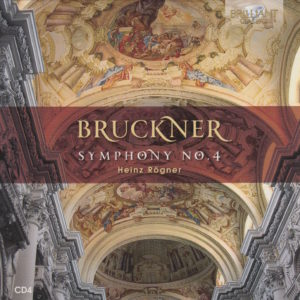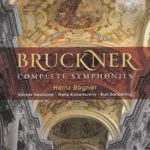 This morning’s conductor of Anton Bruckner’s Symphony No. 4 in E Flat Major (WAB 104), titled “Romantic” by Bruckner himself, is Heinz Rogner (1929-2001), who was born in Leipzig, Germany.
This morning’s conductor of Anton Bruckner’s Symphony No. 4 in E Flat Major (WAB 104), titled “Romantic” by Bruckner himself, is Heinz Rogner (1929-2001), who was born in Leipzig, Germany.
I have never heard a performance conducted by Heinz Rogner.
This is my first.
From his bio on Wikipedia:
From 1958 to 1962, Rögner was chief conductor of the Leipzig Radio Orchestra. From 1973 to 1993, he was chief conductor of the Berlin Radio Symphony Orchestra. In 1984, he became chief conductor of the Yomiuri Nippon Symphony Orchestra, and in 1990 took the title of permanent guest conductor.
 But before I get too subjective about this morning’s recording, here are the nuts and bolts:
But before I get too subjective about this morning’s recording, here are the nuts and bolts:
Bruckner’s Symphony No. 4 in E Flat Major composed in 1874
Heinz Rogner conducts
Rogner used the 1886 version, edited by Nowak
Rundfunk-Sinfonie-Orchester Berlin plays
The symphony clocks in 58:17
This was recorded in July, 1983, and January, 1984
Rogner was 53 or 54 when he conducted it
Bruckner was 50 when he composed it
This recording was released on the Brilliant Classics label
Of the 1886 version, its entry on Wikipedia tells us this:
1886 revision
The 1886 version is the same as the 1881 version but includes a number of changes made by Bruckner while preparing a score of the symphony for Anton Seidl, who took it with him to New York City. This version was published in an edition by Nowak in 1953, based on the original copyist’s score, which was rediscovered in 1952 and is now in the collection of Columbia University. In the title of Nowak’s publication, it was confusingly described as the “1878-1880 version”. It was performed in New York by Seidl on 4 April 1888.
From the essay on Symphony No. 9 (written by Dirk Stove and translated by J&M Berridge):
Heinz Rogner did not make it easy for journalists. Unpretentious and modest as he was, he always tried to evade personal questions and steer discussion in the direction of music instead. That certainly did not help bring him acclaim for his many interpretative and directing achievements. Especially after the fall of the Berlin Wall, an East German performer who eschewed any form of showmanship and had done nothing spectacular was unlikely to become a centre of attraction for the media.
It would nevertheless be quite wrong to conclude that he was not a “success” – a term which of course has various shades of meaning.
Seen against the backdrop of such influences, Heinz Rogner’s readings of Bruckner are very individual and easily recognizable, being characterized by sometimes quite brisk tempi, the prevalence of a soft, round and always “corporeal” tone and almost three-dimensional tonal architecture.
Bruckner wrote his symphonies in four parts. The time breakdown of this one (Symphony No. 4 in E Flat Major, 1886 version), from this particular conductor (Rogner) and this particular orchestra (Rundfunk-Sinfonie-Orchester Berlin) is as follows:
I. Bewegt, nicht zu schnell (With motion, not too fast) (E-flat major)…………..15:12
II. Andante, quasi allegretto (C minor)…………………………………………………………13:35
III. Scherzo. Bewegt (With motion) – Trio: Nicht zu schnell (Not too fast) (B-flat major)……………………………………………………………………………………………………………..10:51
IV. Finale: Bewegt, doch nicht zu schnell (With motion, but not too fast) (E-flat major)………………………………………………………………………………………………………………18:26
Total running time: 58:17
Okay. Now for the subjective stuff…
My Rating:
Recording quality: 5
Overall musicianship: 5
CD liner notes: 4 (decent essays on each Bruckner symphony, but virtually no information about the conductors)
How does this make me feel: 4
I was very close to a “Huzzah!” with this recording. It was everything it should have been – masterful, expressive, stirring. I especially noticed the chord progression in Movement II (Andante) within the first two minutes. Also, I love the ending of the Finale (Movement IV) from about the 15:50 mark onward.
The recording quality – as with almost all recordings released by the Brilliant Classics label – is superb.
My quibble with this box set is the lack of information about the conductors. There’s a fair bit about Rogner in the essay on Symphony No. 9. But very little about any of the other conductors, who – from what I gathered Googling them – were quite acclaimed and fascinating in their own right.
So I stifled my “Huzzah!” and will hold out for the full throttle squee until I see more about the other conductors in this box set.
As the excerpt from the essay about Rogner reveals, this is indeed a “brisk” reading of Bruckner, one of the swiftest I’ve heard so far.
That, too, was a plus. This was Bruckner with no frills. Just pure music.
This is a wonderful performance.
